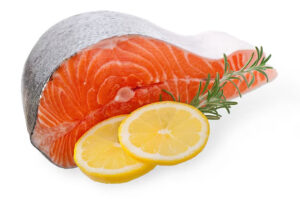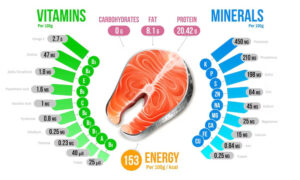Does salmon help people lose weight? Undoubtedly, yeah! One of the healthiest things you can add to your diet is salmon. It is renowned for having good fats, but how does it perform in terms of promoting a healthy weight? Learn more about salmon, including its nutritional makeup, health advantages, and whether it encourages healthy weight loss, by reading on.
Here is how to incorporate salmon into your diet:
effects of salmon on weight loss?
Salmon Health Benefits
How to consume salmon to lose weight
Effects of Salmon on Weight Loss
Salmon does indeed help you lose weight. You could believe that salmon is unsuitable for a diet focused on weight loss because it is characterised as a fatty fish.
However, it’s crucial to keep in mind that salmon has a very low calorie content—just over 200 calories per serving—when planning a meal plan for weight loss. But keep in mind that when trying to lose weight, it’s not only about calories. A salmon good for weight loss, balanced diet that promotes your entire health is what you want to achieve. Beyond its calorie content, salmon has several other advantages. It is a good source of protein, omega-3 fatty acids, and other elements that support good health. You may take advantage of salmon’s nutritional benefits while working towards your weight loss objectives by include it in a well-rounded weight loss meal plan. For long-term success, keep in mind the importance of total balance and nourishment.

Salmon is a fantastic source of protein and has a reasonable amount of calories, which is important for people who want to lose weight in a healthy way.
What Takes Place If Salmon Is Consumed Daily?
The general public can eat salmon every day for a variety of reasons. Salmon should be acquired sustainably to guarantee it is free of contaminants if you eat it every day. Contrarily, pregnant women should eat 8 to 12 ounces of salmon per week.

The second-highest food consumed in the United States in 2020 is predicted to be seafood. In general, salmon captured for human consumption is wild-caught; salmon raised for human consumption is fish intended for human consumption. Omega-3 fatty acids, which are abundant in salmon and are essential for both the preservation of cell structure and the growth of new cells. You can correct irregular cardiac rhythms, keep your blood pressure under control, and prevent blood clotting by eating fish.
Nutritional data for salmon
Here are some fun facts about salmon.

Each serving of salmon contains 37.4mg of sodium, 5.4g of fat, including good-for-you polyunsaturated and monounsaturated fats, 17g of protein, and 121 calories. Salmon is free of fibre, sugars, and carbohydrates.
Wild salmon weighs 3.5 ounces (100 grammes), which provides:
- 182 calories
- 25 grammes of protein
- 8 grammes fat
- Grammes of carbohydrates: 0
- Vitamin B12: 127% of the recommended daily intake
- Vitamin B6: 56% of the recommended daily intake
- Selenium: 85% of the recommended daily intake
- Niacin: 63% of the recommended daily intake
- Pantothenic acid: 38% of the recommended daily intake
Note that wild salmon has a little better nutritional profile than farmed salmon. In particular, wild salmon has more protein and less calories than farmed salmon. The nutritional differences between the two varieties of salmon should eventually be insignificant.
Why Salmon Is The Ideal Protein Because It Is Both Delicious And Healthful
More protein than most other forms of protein is found in salmon, which has a high quantity of protein. Salmon is a fantastic source of nourishment for weight loss in addition to being low in fat.
So salmon is a wise choice if you’re seeking for a wholesome protein source that’s also low in calories and fat.
Is Salmon Bad to Eat Everyday?
No, eating salmon regularly is not bad. Salmon is a nutritious food that contains vitamins B12, protein, and omega-3 fatty acids. Salmon can be a fantastic addition to a diet that aims to lose weight because it is also a low-calorie item.
Fish Diet Plan
The salmon diet is a fantastic strategy to shed pounds and enhance your general health. A large portion of this diet is built on consuming salmon frequently because it is a great source of protein, good fats, and omega-3 fatty acids. Salmon is a fantastic option for a balanced diet because it is also a wonderful source of vitamins and minerals.
Salmon Health Benefits
- Excellent source of omega-3 fats. One of the best and easiest to find sources of heart-healthy omega-3 fatty acids is salmon. The American Heart Association recommends eating at least two servings of salmon each week (1 serving = 3 ounces of cooked salmon), even though there are no official guidelines for how much omega-3 fats you should consume daily.
- A good protein source. Salmon is a good source of protein, which is essential for building and repairing body structures, including muscle, and is present in many varieties of fish. Since muscle tissue burns more fat when at rest, adding muscle can quicken weight loss. High-protein meals can also help you feel satisfied for a longer period of time after eating, preventing you from having unhealthy cravings.
- Possesses anti-inflammatory and antioxidant qualities. In addition to the omega-3 fats, salmon also contains additional chemicals, including astaxanthin, that have a high antioxidant and anti-inflammatory effect. Through its antioxidant effect, astaxanthin, the substance that gives salmon its distinctive pink colour, has been shown to shield the body from oxidative and inflammatory damage.
- Encourages weight loss. Salmon is the perfect food for people wanting to reduce or maintain their weight due to its high protein and moderate calorie content. According to studies, those who eat fish typically weigh less than those who don’t.
- Packed with little nutrients. In addition to being high in macronutrients, salmon is also high in micronutrients. B vitamins and selenium, one of the most significant antioxidants in the body, are particularly abundant.
- Salmon is generally inexpensive and readily available, especially when you consider all the health benefits it provides. It cooks completely in less than 30 minutes and is also incredibly adaptable.
Tips for Eating Salmon to Lose Weight
Salmon is highly adaptable, as we’ve already discussed, offering you a variety of ways to enjoy it. You can prepare salmon in the manner listed below, whether you’re attempting to lose weight or not:
- Salmon that has been fried or seared.
- Cooked salmon
- Baking salmon
- Seafood air-fried
- Smoked fish
- Salmi dried
- Salmon steaming
- Final Reflections
Salmon is a nutritional powerhouse with numerous amazing health benefits.
By consuming at least two servings every week, you can satisfy your nutritional needs and reduce your chance of contracting numerous ailments.
Salmon is also filling, tasty, and versatile. It’s probable that frequently consuming this oily fish will improve your health and general well-being.
The conclusion
Does salmon help people lose weight? Scientific proof demonstrates that it is. It helps you lose weight by giving you protein, which enhances satiety, muscle mass, and healthy fats, which prolong your feeling of fullness. Before including salmon in your weight-loss diet, please consult your doctor.
FAQs
Can you lose weight through eating salmon each day?
Yes, if you want to lose weight, you can eat salmon every day. To lose weight, nevertheless, salmon is not a need. You can also try chicken, meat, beans, and peas as additional protein options. There are still many options available to you if you wish to remain with fish, including prawns, prawns, prawns, cod, mackerel and sea bass.
Is salmon too fatty to help you lose weight?
Salmon is not overly fattening for weight reduction. In actuality, there are less than 10 grammes of fat in a plate of wild salmon. Because salmon is said to be rich in healthy fats, it is simple to believe that it is highly greasy. However, these healthy fats are only present in very little levels. Because we require so little of these fats to maintain our health, we continue to refer to it as being rich in them.
Which fish is the greatest for losing weight?
Fish in general promotes weight loss. This contains fish such as trout, tuna, salmon, cod, prawns, seabass, mackerel, and many others.
How much salmon is beneficial for losing weight?
Depending on specific characteristics including calorie requirements, a person’s total dietary plan, and personal tastes, the quantity of salmon that is thought to be appropriate for weight loss can change. Aim for two to three servings of fish each week, including salmon, according to standard recommendations. Typically, 3 to 4 ounces (85 to 113 grammes) of cooked salmon make up each dish. This serving size offers a sufficient quantity of protein and beneficial fats while limiting calorie intake. To build a balanced and calorie-controlled weight loss strategy, don’t forget to balance your meals with a variety of other healthy foods.
Salmon Overdose: Is It Possible?
According to Harvard Health Publishing, consuming too much salmon can result in mercury poisoning. Most types of seafood include mercury, however some are better than others.



